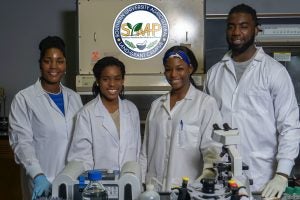Struggle, policing, and advocacy were words used by Black faculty from several universities to describe working in science, technology, engineering and math-related fields in a conversation on discrimination in STEM.
The online event was called “Anti-Racism in STEM,” where Black faculty shared what it is like being in a “White dominated field.” This event was in light of recent discussions involving Dr. Ibram Kendi’s 2019 book How to Be an Antiracist.
The organizer of the event was Nirvana Almada, a biochemistry major at California State University-Chico and senator to the College of Natural Sciences at the time. Her intention with this event was to promote conversations and confront problems dealing with diversity and representation that she saw many science colleges were having, she said.
“There is a lack of discussion on the lack of diversity in the sciences in academia, where fellow students are not being recognized or heard,” Almada said. “If discussions are the way to dissect these problems, then we’re going to have them.”
» Related: Uncomfortable conversations help drive diversity in agriculture
Minority people are underrepresented in professional fields dealing with science, technology, engineering, and mathematics — and agriculture is not excluded from this. According to the National Science Foundation, the STEM workforce is 89 percent White and 72 percent male. According to the U.S. Department of Agriculture, 81 percent of farm operators in my home state of California are White.
Though these statistics don’t include LGBTQ+ people or people with disabilities, it appears that while the United States becomes more diverse as a whole, the more niche STEM fields do not reflect this trend.

The “Anti-Racism in STEM” event started with an approximate half-hour discussion led by three guest speakers, Raquel Christine Montgomery, Dr. Pascale Guiton, and Dr. Arebu Abdu. They discussed how they got into their fields, how their racial identity influenced their journeys in their fields, and what people should do to be an antiracist.
The speakers each had different goals for their participation. Montgomery, a student program specialist at San Diego State, wanted to show people of color how statistics show and influence their involvement in U.S. society.
“By using the statistics and understanding the history of racism, we can understand how racism is systemic,” Montgomery said. She hopes to use research and data gathering as a tool to bridge the gaps in college that exclude Black and Indigenous people of color.
This concept works similarly with agricultural literacy and the kind of impact the National FFA Organization has on students in urbanized communities, which is where most people of color live. With diverse agriculture teachers, we can provide an inclusive and impactful learning environment that enhances every student’s learning experience in agriculture.
The topics discussed in the event also resonated with students who were not a part of the sciences. Francisco Gonzalez-Hernandez, a business management student, said the conversation hour was effective and necessary.
“The things they were talking about, like the lack of diversity sounded very similar to what I notice in the College of Business,” Gonzalez-Hernandez said. “I think it was effective because I left knowing more than I did before coming.”
Diversity in all fields is important for many reasons. Not only can it help increase profits, but it’s beneficial for customer connection, providing opportunities to diverse communities and constant innovation. To create products that work for everyone, it’s necessary to include input from a diverse range of people. The STEM field needs to grow and diversify with society.
Given the success of her event, Almada said the future for these conversations looks bright.
“Today’s event was just a small stepping stone,” Almada said. “In the future, I hope our college has more events like this because if these things are happening to our speakers, then it is probably happening with our students here too, and that it is not OK.”
Guiton had advice of her own to share on how to be an antiracist and an ally to the Black faculty.
“Listen to your Black coworkers,” she said. “If we say something is racist, there’s a reason why.”
Saul Reyes serves as the 2022 American Farmland Trust Agriculture Communications Intern at AGDAILY, with a focus on helping to amplify diversity and minority voices in agriculture. An FFA alum, Reyes is a student at California State University-Chico and is double majoring in plant and soil science and multicultural and gender studies, while minoring in intersectional Chicanx/Latinx studies and public relations. He can be found on Twitter @sreyes710.





